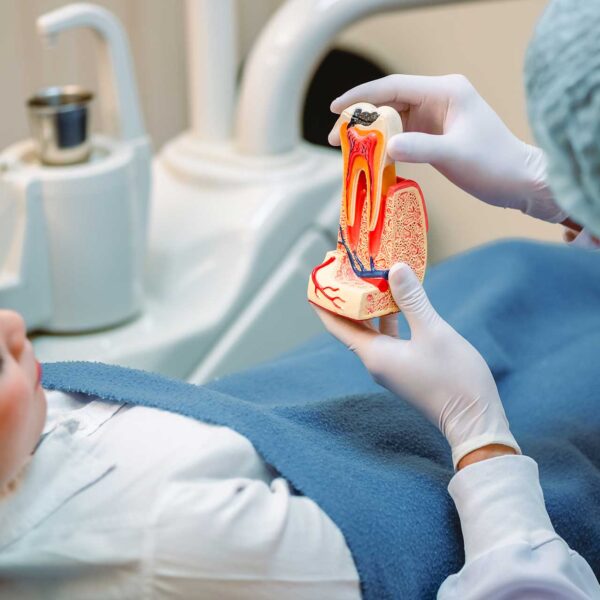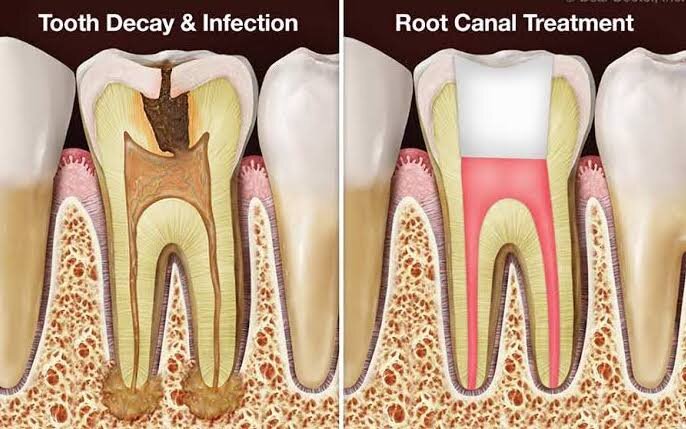
Root Canal
A root canal is a dental procedure used to treat infection or damage in the pulp, the innermost part of the tooth, which contains nerves, blood vessels, and connective tissue. This treatment aims to save a severely damaged or infected tooth instead of removing it, helping to preserve natural teeth and maintain oral health.
When is a Root Canal Needed?
Root canals are typically needed when the pulp inside a tooth becomes infected or inflamed due to:
- Deep Decay (Cavities): Untreated cavities that extend to the pulp.
- Cracks or Chips: Damage that allows bacteria to reach the pulp.
- Repeated Dental Procedures: Multiple restorations on the same tooth can weaken and irritate the pulp.
- Injury: Trauma to the tooth, even if there are no visible chips or cracks.
Open Hours
- Monday – Sunday:9.00 Am – 21.00 Pm
Types of Root Canal
1. Non-Surgical Root Canal (Root Canal Therapy):
This is the most common type of root canal procedure. It involves accessing the infected pulp through a small hole drilled into the tooth’s surface. The infected pulp is removed, the root canals are cleaned and shaped, and then filled and sealed.
2. Surgical Root Canal (Apicoectomy): This procedure is necessary when a non-surgical root canal is unsuccessful or when there is a problem at the tip of the root. It involves a small incision in the gum tissue to access the root tip and remove any infected tissue. The root canal is then cleaned and filled, and the incision is closed.

Procedure for Root Canal
- Anesthesia: Local anesthesia is administered to numb the area.
- Pulp Removal: The dentist creates a small opening in the tooth’s crown and removes the infected pulp using specialized dental instruments.
- Cleaning and Shaping: The root canals are cleaned and shaped to remove all infection and debris.
- Filling and Sealing: The cleaned canals are filled with a rubber-like material called gutta-percha to seal them and prevent reinfection.
- Restoration: A dental crown is usually placed over the tooth to protect it and restore its function.
Benefits of a Root Canal
- Pain Relief: Root canals eliminate the source of pain caused by infected or damaged pulp.
- Preservation of the Natural Tooth: The procedure saves the tooth, maintaining alignment and the natural bite.
- Improved Oral Health: Removing infection prevents the spread of bacteria to surrounding teeth and gum tissue.
- Enhanced Functionality: Restoring the tooth with a crown after a root canal allows it to function like a natural tooth.
FAQ'S
1. What is a root canal?
- A root canal is a procedure that treats infection or damage in the tooth’s pulp, which contains nerves, blood vessels, and connective tissue. It involves removing the infected pulp, cleaning and disinfecting the canals, and sealing the tooth to prevent further infection.
2. Why do I need a root canal?
- You may need a root canal if the pulp inside your tooth is infected or inflamed due to deep decay, cracks, repeated dental work, or injury. This treatment can save your tooth, relieve pain, and prevent the infection from spreading.
3. What are the symptoms that indicate a root canal is needed?
- Signs include severe tooth pain, especially when chewing, prolonged sensitivity to hot or cold, swelling or tenderness in nearby gums, tooth discoloration, and sometimes a small bump on the gums near the affected tooth.
4. Is a root canal painful?
- Root canals have a reputation for being painful, but modern anesthesia and techniques make them about as comfortable as getting a filling. The procedure actually relieves pain by removing the infection in the tooth.
5. How long does a root canal procedure take?
- Most root canals take about 60 to 90 minutes, though the exact duration depends on the complexity of the tooth. Some teeth may require more than one visit if they have multiple canals or if the infection is severe.
6. How much does a root canal cost?
- The cost varies depending on factors like the tooth’s location and the severity of the infection. Typically, front teeth are less costly than molars. Insurance often covers a portion of the cost, but it’s best to check with your provider.
7. Can I go back to work after a root canal?
- Yes, most people can return to their regular activities right after the procedure, though you may want to take it easy if you feel any discomfort. Avoid chewing on the treated tooth until it is fully restored with a crown or filling.
8. What is involved in root canal aftercare?
- After the procedure, you may experience mild discomfort or sensitivity, which can usually be managed with over-the-counter pain relievers. Follow good oral hygiene, avoid chewing on hard foods, and see your dentist for follow-up care if necessary.
9. How long does a tooth last after a root canal?
- With proper care, a tooth that has undergone a root canal can last a lifetime. Regular brushing, flossing, and dental checkups help prolong the tooth’s health and function.
10. Do I need a crown after a root canal?
- Most back teeth, like molars, typically require a crown after a root canal to restore strength and prevent fracturing. Some front teeth may only need a filling, but your dentist will recommend the best restoration based on your tooth’s condition.


